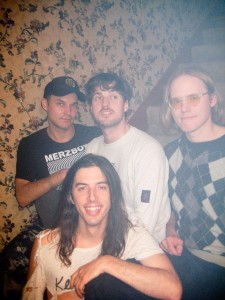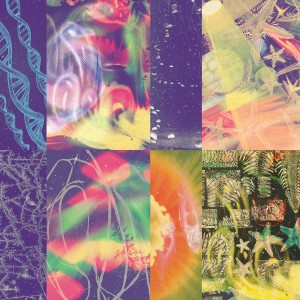
Artist

IMAGES: To download, click above. Photo credit Anna Maria Trudel.
LINKS:
Website Paradise of Bachelors
Bandcamp
Twitter
Instagram
YouTube
Facebook
Spotify
Nap Eyes
Paradise of Bachelors
Nap Eyes’ metamorphic fifth long-player collects a cache of nine fascinating songs recorded over the four years since Snapshot of a Beginner.
The Neon Gate reveals classic touchstones (the uneasy interplay of physics and philosophy, perambulatory meditations, self-interrogating soliloquies, apertures of surreality, video games), but also evidence of divergent impulses toward nonlinear abstraction and longform improvisational composition (resulting in their most discursive, deconstructed, and deliquescent songs to date) and narrative and lyric formality (including adaptations of thorny poems by Alexander Pushkin and W. B. Yeats), imparting the sense that Nap Eyes have transmuted, as has their understanding of what a song is, what it can do, where it might go. (Including color inner sleeve with lyrics.)
Masters of subtlety. – NPR
Snapshot of a Beginner feels as much a modest masterpiece as [The Go-Betweens’] Spring Hill Fair or [Belle and Sebastian’s] Tigermilk. What sets them apart is the fear and trembling. – Uncut
One of the most fascinating songwriters we have today. – Newsweek
ALBUM NARRATIVE
FINAL TRANSMISSION FROM THE NEON GATE / 20240730 / 0900R
The abstract joy,
The half-read wisdom of daemonic images,
Suffice the ageing man as once the growing boy.
W. B. Yeats
In 1922, as the Irish Civil War raged, William Butler Yeats (1865–1939) wrote his “Meditations in Time of Civil War” while summering in Thor Ballylee, a Norman tower. In the final section of this visionary poem, tortuously titled “I See Phantoms of Hatred and of the Heart’s Fullness and of the Coming Emptiness,” the poet climbs “to the tower-top” to survey (or conjure) a fantastical scene involving, among other things, ladies riding “magical unicorns,” Babylonian prophecies, and Jacques Molay (the final grand master of the Knights Templar, burned at the stake in 1314 for his supposed heresy and homosexuality). “Frenzies bewilder, reveries perturb the mind,” Yeats writes. “Monstrous familiar images swim to the mind’s eye.”
After three years of silence, the Canadian band Nap Eyes have returned with their own meditations on the monstrous and familiar (or the monstrously familiar). The Neon Gate, their metamorphic fifth long-player, collects a cache of nine fascinating reveries recorded over the four years since their last album, Snapshot of a Beginner (five of which were released episodically throughout the spring and summer of 2024). “I See Phantoms of Hatred and of the Heart’s Fullness and of the Coming Emptiness,” the album’s colossal penultimate track, is, along with “Demons,” their languorous adaptation of a phantasmagorical poem by Russian Romantic Alexander Pushkin (1799–1837), one of two ambitious but adept adaptations in which singer and principal songwriter Nigel Chapman unravels knotty, century-old verse into a fluid, memorable melodies across the loom of the band’s pulsing instrumental syncretism.
This fresh engagement with narrative and lyric formality complements the seven original songs on the record, which reveal classic Naps touchstones (the uneasy interplay of physics and philosophy, the nexus of fantasy and science fiction, perambulatory descriptions of landscape and weather, self-interrogating soliloquies, apertures of surreality, technological anxiety, video games), but also evidence of divergent impulses toward nonlinear abstraction and longform improvisational composition (resulting in their most discursive, deconstructed, and deliquescent songs to date). With The Neon Gate Nap Eyes have transmuted, as has their understanding of what a song is, what it can do, where it might go.
That all sounds deadly serious, but these songs are also as funny, quirky, and touching as ever, juxtaposing absurdist Middle Ages settings with concisely rendered quotidian details of journeys between earthly and cosmic planes (see the picaresque “Passageway” in particular). Castles and mystical critters abound, and faith in chemistry, astrophysics, and naturalistic observation tempers the spiraling doubt that can accompany deep cogitation. So the humble titular birds of opening track “Eight Tired Starlings” (Star Birds) must navigate light beams, curving spacetime, gravitational waves, and “billion-years-distant” galactic collisions. The pocket light beam, “complacent wizard,” and “breakfast plate” of eight-minute closing track “Isolation” (written, naturally, during COVID-19 pandemic lockdown) catalyze an uncomfortable revelation in the form of a one-liner: “how to get crushed under a gigantic / metaphysical rock.” In between, piloted by the band’s subtle, synthetic rhythms, “Feline Wave Race” emerges from Chapman’s current improvisational writing practice and experiments with spontaneous composition. We are transported, in the company of a digital wildcat, from deep space through telescoping deep time—“when the gas clouds / pass away and / the molecules / distribute / all across the fabric / of the horizon”—from “the edge of the moat / of the 13th-century castle” to 1996, the year Nintendo released the jetskiing video game Wave Race 64.
The recording methodology informed how the other band members—Seamus Dalton, Josh Salter, and Brad Labelle, often supplementing or supplanting their customary respective roles on drums, bass, and guitar with synthwork and drum programming—kept pace with this dream logic. Nigel recorded demos—many involving loops—and the band built recursive fractal patterns upon those skeletal armatures, often remotely (sometimes with assistance from engineer René Wilson). The origins of even the most otherworldy songs were often intimately domestic. Although most vocals were tracked live with the band, Nigel recorded his vocals for “Feline Wave Race” and “Dark Mystery Enigma Bird,” two disjunctive fables about animals told through stream-of-consciousness narratives, in a blanket-draped children’s cardboard castle in his parents’ basement.
When they exist at all verse-chorus-verse structures often disintegrate in favor of an unhurried unfolding, an emphasis on marking, attenuating, and collapsing time over standard musical notions of progression or refrain, a foregrounding of ellipsis over resolution. Only the careening “Ice Grass Underpass,” written in 2009, predating the band’s existence but prefiguring the sonic signature of their foundational first two albums, closely resembles, with Labelle’s snowy guitar squall (also evident in his lacerating, atonal leads scribbling through “Tangent Dissolve”), their older material. Speaking of snow: half-blinded by a blizzard and in danger of losing their way and plunging “headlong into some damned ravine,” the “master” and coachman of “Demons” are first mystified and then petrified by eerie apparitions of uncanny but uncertain spectral nature. “Is there a witch who is getting married?” the coachman speculates earnestly. “Some goblin they’re burying?”
These are demonic images, for sure, and this is familiarly eldritch territory for Nap Eyes, who in 2021 released “Blood River,” a song inspired by their online Dungeons and Dragons campaign. But beyond the Neon Gate, Yeats’s “wisdom of daemonic images”—in the ancient Greek sense of an animating human spirit, lacking any suggestion of evil—pertains more in these songs, inscrutably beautiful riddles which, a full decade into Nap Eyes’ career, “suffice the ageing man as once the growing boy.”
CREDITS
Side One
Eight Tired Starlings
Dark Mystery Enigma Bird *#
Demons
Feline Wave Race *#
Side Two
Tangent Dissolve $
Ice Grass Underpass +
Passageway
I See Phantoms of Hatred … +#
Isolation
All songs mixed and recorded by René Wilson
at Value Sound Studios (Montreal, QC) except:
* recorded by Nap Eyes (Windsor, NS)
+ recorded by Nigel Chapman at Studio Dolly
(Montreal, QC)
# mixed by Brad Loughead
$ mixed by René Wilson + Brad Loughead
Mastering and lacquers by Josh Bonati (Brooklyn, NY)
Music by Nap Eyes
Nigel Chapman – vocals, guitars, synths, drum programming
Brad Loughead – guitars, bass, synths, drum programming
Josh Salter – bass, guitars, synths
Seamus Dalton – drums, guitars, synth
Hammond Organ on “Tangent Dissolve” by René Wilson
℗ & © 2024 Paradise of Bachelors (worldwide) | Paper Bag Records (Canada)
PoB-077 | All rights reserved
PO Box 1402, Carrboro, NC 27510, USA | paradiseofbachelors.com
All lyrics by Nigel Chapman except:
“Demons”
Original poem text (Russian)
by Alexander Pushkin (1799 – 1837)
English translation by D. M. Thomas (1935 – 2023)
Copyright The Estate of D. M. Thomas
c/o Johnston & Alcock Ltd.
West Wing, Somerset House, London WC2R 1LA
“I See Phantoms of Hatred and of the Heart’s Fullness and of the Coming Emptiness”
Original poem text by W. B. Yeats (1865 – 1939)
Art and design by Josh Salter
Layout by Josh Salter and Brendan Greaves

